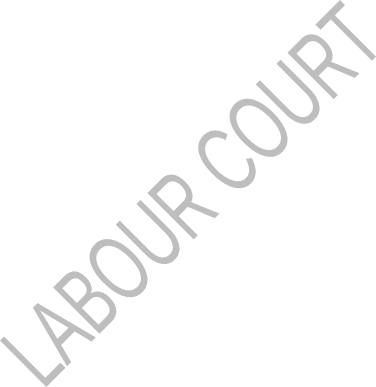1


IN THE LABOUR COURT OF SOUTH AFRICA, DURBAN
Not Reportable
Case no: D1558/18
In the matter between:
SIZWE HADEBE Applicant
and
MSUNDUZI MUNICIPALITY Respondent
Heard: 15 August 2018
Delivered: 17 August 2018
Summary: Urgent application. Precautionary suspension.
judgment
GUSH, J
The applicant in this matter applied as a matter of urgency for a rule nisi to be issued calling on the respondents to show cause why:
The suspension of the applicant effected on 2 August 2018 should not be declared unlawful and be set aside;
The applicant should not be reinstated as municipal manager with immediate effect; and
Costs.
This relief was to operate with immediate effect pending the outcome of this application.
The matter was first brought before Cele, J and was adjourned to 15 August 2018 to enable the respondent to file an answering affidavit. No interim relief was granted.
It was my understanding that the parties were at idem that not only was it unnecessary to deal with the interim relief pending a return date, but that the Court was to consider at this stage only the issue of urgency.
In particular, the parties agreed that the Court was to determine whether the suspension was unlawful or not. If the suspension was unlawful then the application was to be considered urgent and the applicant would be entitled to relief viz: that the suspension should be set aside; alternatively, if the suspension was not unlawful the application was not urgent and fell to be struck off the roll.
The suspension of the applicant was given effect to on 2 August 2018. The respondent’s had resolved, as a precautionary measure, to suspend the applicant was for the purpose of completing the investigation. The reason for the suspension was that the respondent believed, inter alia, the applicant may, if not suspended, interfere with the investigation or interfere with witnesses. The investigator had been granted a three-week extension to complete the investigation. It was accordingly apparent that the precautionary suspension was likewise for a period of three weeks which will expire on 23 August 2018.
Mr De Wet, who appeared for the applicant argued that the respondent had not complied with regulation 6 of the Local Government: Disciplinary Regulations for Senior Managers, 2010, and therefore the suspension was unlawful for non-compliance. The regulation is headed ‘Precautionary Suspension’ and provides:
‘6. (1) the municipal Council may suspend a senior manager on full pay if it is alleged that the senior manager has committed an act of misconduct, where the municipal Council has reason to believe that –
(a) the presence of the senior manager at the workplace may –
(i) jeopardize any investigation into the alleged misconduct;
(ii) in danger the well-being or safety of any person or municipal property; or
(iii) be detrimental to stability in the municipality; or
(b) the senior manager may –
(i) interfere with potential witnesses; or
(ii) commit further acts of misconduct.
(2) before a senior manager may be suspended, he or she must be given an opportunity to make written representations to the municipal Council why he or she should not be suspended, within seven [7] days of being notified of the Council’s decision to suspend him or her.
(3) the municipal Council must consider any representation submitted to it by the senior manager within seven [7] days.
(4) after to consider the matter set out in sub-regulation (1), as well as the senior manager’s representations contemplated in sub- regulation (2), the municipal Council may suspend the senior manager concerned.1
The primary purpose and function of this regulation is to provide municipal Council with the authority to suspend a senior manager. In applying this regulation, the municipal Council must comply with two requirements:
8.1 The first is that there must be an allegation that the senior manager has committed an act of misconduct;
The second is that the municipal Council must have reason to believe, in general terms that the presence of the senior manager at the workplace may jeopardize the investigation, interfere with potential witnesses or be detrimental to the stability of the municipality.
Mr De Wet referred to a number of judgments of this Court in which it had been held that in general an employee should be given sufficient particularity of the misconduct and sufficient reasons why suspension is deemed necessary to allow the employee to respond to the decision to potentially suspend him. I have considered these judgments and I am satisfied that whilst they prescribe a general rule, it is however necessary that the Court must take into account the specific circumstances of each case in order to determine whether there has been compliance with the regulations and accordingly whether or not the suspension is unlawful.
It is apparent from the pleadings in this matter that firstly the investigation being conducted in terms of the disciplinary regulations had not been completed. Secondly as a result it is clear that neither the investigator nor the municipal Council have reached any final decision as to the specifics of any alleged misconduct.
In this matter the suspension is unquestionably not punitive but merely to allow the investigator to complete the investigation unhindered and it is therefore precautionary in nature. It is apparent that the duration of the suspension is linked to the extension of the investigation and is of limited duration.
It is clear from the provisions of the disciplinary regulations that a municipal Council may only charge a senior manager after receipt of the investigation report and recommendations by the investigator; the report and recommendations are to be tabled before the municipal Council according to a timeframe; and in deciding to institute disciplinary proceedings against the senior manager it must determine whether the misconduct is serious or “less serious”.
That being so, in this matter, the specifics of any possible charge of misconduct have not been determined. The investigation is ongoing. The provisions of regulation 6 specifically titled “precautionary suspension” appears to be designed to facilitate, where the investigation is incomplete, the completion of such investigation. The authority to suspend is therefore dependent upon whether “the respondent [municipal Council] has reason to believe that” the presence of the applicant at the workplace may jeopardize the investigation into the alleged misconduct; is detrimental to stability in the workplace and that the applicant may interfere with potential witnesses.
It is clear from the pleadings that the respondent by virtue of a letter dated 24 July 2018 issued the applicant with a notice of the intended precautionary suspension. The notice advised the applicant that the municipal Council had resolved to invite him to make representations as to why he should not be placed on precautionary suspension. The notice in this regard specifically provided:
‘In your position as municipal manager, you occupy a strategic position in the workplace and, as such, have access to sensitive documentation, including documentation that is required for the investigation. You also in a position where you may well be able to influence employees for interfere with potential witnesses. In addition, you are well aware that the prevailing atmosphere the workplace is tense and, consequently, your continued presence at the workplace may jeopardize the ability of the investigator to conduct the investigation freely and unhindered.’2
Nothing could be clearer. The respondent has explained in more than sufficient detail the reasons why it believes that the applicant should be suspended as a precautionary measure pending the outcome of the investigation.
On 2 August 2018 when the respondent issued the “Notice of Precautionary Suspension of the City Manager” the mayor who signed the letter again set out in paragraph three of that letter, the respondent’s reasons for imposing the precautionary suspension.
The gist of the applicant’s submissions regarding the proposed precautionary suspension appears to be a suggestion that he has not interfered with the investigation or potential witnesses in the past and therefore he should not be suspended. The regulation does not require that the senior manager should have been guilty of such interference in order to allow the municipal Council to suspend. It simply provides that where the municipal Council has reason to believe that this will happen it may suspend. There is nothing to gainsay the averment made by the author of the suspension letter [the mayor] that the respondent had carefully considered the applicant’s written representations.
I am accordingly satisfied that the respondent has clearly set out the reasons why it believes that the presence of the applicant may jeopardize the investigation.
Mr De Wet argued that the fact that the applicant had listed the provisions of regulation 6(a) (i) (iii) and (b) (i) rendered the decision unlawful in that it simply paraphrased the regulation and that these are mere conclusions. This ignores the fact that the respondent has specified reasons that stand apart from the conclusions and the recordal of the provisions of the regulation as set out in the Disciplinary Regulations viz. that, given the applicants seniority, the applicant’s presence at the workplace may jeopardize the investigation or that he may interfere with potential witnesses. This is not unreasonable.
Mr De Wet also argued that the notice of the intended precautionary suspension does not set out in sufficient particularity the nature of the misconduct and is therefore unlawful. In order to determine whether or not the notice is in compliance with the requirements of regulation 6 it is necessary to consider the surrounding circumstances.
It is clear from the pleadings that the investigation, that is regulated by the same regulations, was not complete nor had the investigator made any recommendation. The municipal Council had not yet decided whether the applicant was in fact guilty of misconduct, or if so whether such misconduct was “of a serious or less serious nature”.
I am satisfied in the circumstances that the notice of intended suspension is sufficiently clear to have enabled the applicant to make representations, as he did. These representations were considered by the respondent.
The purpose of the suspension was not, as is often the case, for the purposes of proceeding with a disciplinary enquiry into specific acts of misconduct. No decision had been made regarding any charges of misconduct. The purpose of the suspension was simply to facilitate the completion of the investigation.
I am therefor not persuaded that the suspension was unlawful or that the respondent did not substantially comply with the requirements of the disciplinary regulations.
As regards to costs; both parties argued that costs should follow the result and that costs should include the costs of two counsel. Mr De Wet was assisted by his instructing attorney.
Accordingly, and for the reasons set out above I make the following order:
Order
The applicant’s application is struck off the roll for want of urgency;
The applicant is ordered to pay respondents costs such costs to include the costs of two counsel.
D H Gush
Judge of the Labour Court of South Africa
Appearances:
For the Applicant: Advocate. A De Wet assisted by S Nzimande
Instructed by: S Nzimande Inc.
For the Respondent: Advocate. M Pillemer assisted by L Naidoo
Instructed by Mdledle Inc
1 Government Notice No. 344 21 April 2011.
2 Annexure SH1 page 19.
